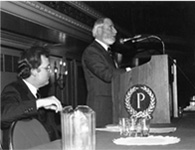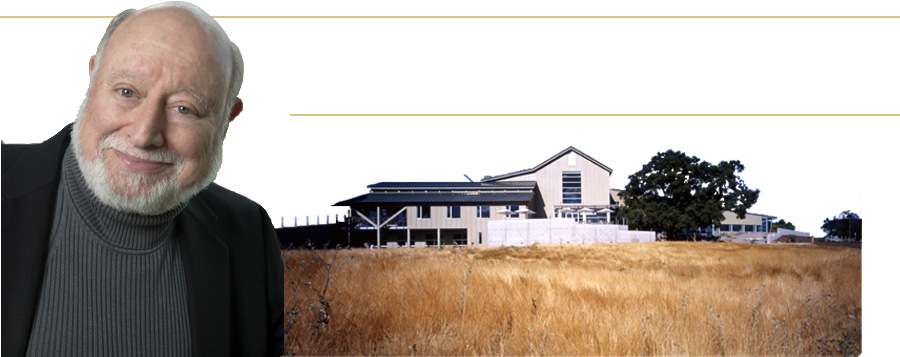Biography
 Lee Shulman was born and raised in Chicago, the only son of Jewish immigrants who owned a small delicatessen called The Logan Delicatessen. These early experiences in the deli led to a profound appreciation of pastrami and the well-marbled life. Educated at a yeshiva high school, Shulman won a scholarship to the University of Chicago, where he studied philosophy and psychology. He entered the department of education and studied with Benjamin Bloom and Joseph Schwab, among others. He was particularly influenced by Schwab’s work on the structure of different disciplines, which later resurfaced in his work on teacher knowledge. This early introduction to disciplinary knowledge has been a consistent thread throughout Shulman’s career.
Lee Shulman was born and raised in Chicago, the only son of Jewish immigrants who owned a small delicatessen called The Logan Delicatessen. These early experiences in the deli led to a profound appreciation of pastrami and the well-marbled life. Educated at a yeshiva high school, Shulman won a scholarship to the University of Chicago, where he studied philosophy and psychology. He entered the department of education and studied with Benjamin Bloom and Joseph Schwab, among others. He was particularly influenced by Schwab’s work on the structure of different disciplines, which later resurfaced in his work on teacher knowledge. This early introduction to disciplinary knowledge has been a consistent thread throughout Shulman’s career.
“Research begins in wonder and curiosity but ends in teaching” – Lee Shulman
 Shulman’s first academic job was with the College of Education at Michigan State University. Never content to stay within departmental boundaries, Shulman collaborated with a colleague in the medical school, Arthur Elstein, who also happened to have been Lee’s college roommate and best man. This collaboration led to a study of medical decision making among expert diagnosticians (Medical Problem Solving). Two themes from this book have continued to resonate throughout Shulman’s careers: 1) the focus on cognition in professional practice, particularly under conditions of uncertainty and 2) the domain-specificity of expertise. He served as founding co-director of Institute for Research on Teaching at MSU, a research center that pioneered the study of teaching and teacher learning from a cognitive perspective, focussing on teacher thinking, decision making, and the conditions for teacher learning.
Shulman’s first academic job was with the College of Education at Michigan State University. Never content to stay within departmental boundaries, Shulman collaborated with a colleague in the medical school, Arthur Elstein, who also happened to have been Lee’s college roommate and best man. This collaboration led to a study of medical decision making among expert diagnosticians (Medical Problem Solving). Two themes from this book have continued to resonate throughout Shulman’s careers: 1) the focus on cognition in professional practice, particularly under conditions of uncertainty and 2) the domain-specificity of expertise. He served as founding co-director of Institute for Research on Teaching at MSU, a research center that pioneered the study of teaching and teacher learning from a cognitive perspective, focussing on teacher thinking, decision making, and the conditions for teacher learning.
“The challenge is to get inside the heads of practitioners, to see the world as they see it, then to understand the manner in which experts construct their problem spaces, their defintions of the situation, thus permitting them to act as they do.”
– Lee Shulman
 In 1982, Shulman moved to Stanford University’s School of Education, where he was to become the Charles E. Ducommun Professor Education. It was in his early years at Stanford that he engaged in in the research that yielded his conception of “pedagogical content knowledge,” the idea that launched a new stage of research in teaching and teacher education). His research team developed and field tested the teacher assessment prototypes that laid the foundation for the National Board for Professional Teaching Standards approach to evaluating accomplished teaching. During his tenure at Stanford (1982-1997) he also served as president of the American Educational Research Association and the National Academy of Education.
In 1982, Shulman moved to Stanford University’s School of Education, where he was to become the Charles E. Ducommun Professor Education. It was in his early years at Stanford that he engaged in in the research that yielded his conception of “pedagogical content knowledge,” the idea that launched a new stage of research in teaching and teacher education). His research team developed and field tested the teacher assessment prototypes that laid the foundation for the National Board for Professional Teaching Standards approach to evaluating accomplished teaching. During his tenure at Stanford (1982-1997) he also served as president of the American Educational Research Association and the National Academy of Education.
“Within the category of pedagogical content knowledge, I include, for the most regularly taught topics in one’s subject area, the most useful form of representation of those ideas, the most powerful analogies, illustrations, examples, explanations, and demonstrations—in a word, the ways of representing and formulating the subject that make it comprehensible to others.” – Lee Shulman
 In 1996, he was named the 8th president of The Carnegie Foundation for the Advancement of Teaching, a position he actively undertook in August 1997, when the home of this 92-year-old institution was moved from the east coast to the Stanford neighborhood. Six years later, it would occupy its newly built home on Stanford land, on a hillside just above the Center for Advanced Study in the Behavioral Sciences overlooking Stanford and San Francisco Bay. During his 11-year service as president, the Foundation celebrated its centennial, building upon the legacy of research and policy in higher and professional education from Henry Pritchett and Abraham Flexner to William Learned and Clark Kerr, and from John Gardner to Ernest Boyer.
In 1996, he was named the 8th president of The Carnegie Foundation for the Advancement of Teaching, a position he actively undertook in August 1997, when the home of this 92-year-old institution was moved from the east coast to the Stanford neighborhood. Six years later, it would occupy its newly built home on Stanford land, on a hillside just above the Center for Advanced Study in the Behavioral Sciences overlooking Stanford and San Francisco Bay. During his 11-year service as president, the Foundation celebrated its centennial, building upon the legacy of research and policy in higher and professional education from Henry Pritchett and Abraham Flexner to William Learned and Clark Kerr, and from John Gardner to Ernest Boyer.

Lee Shulman has spent his professional life advocating for the importance of teaching at all levels, from kindergarten through graduate school. He is best known for his work on the knowledge base of teaching, including the construct of pedagogical content knowledge, for his efforts to promote the scholarship of teaching and learning in higher education, and for his studies of professional education. Since his retirement from the presidency of the Carnegie Foundation in 2008, he has devoted much of his attention to the field of Jewish Education and the importance of developing rigorous applied research at the intersection of religion and education. This website reflects the range of his interests and his impact on scholarship and institutions worldwide.
- 1968 – Fellow, American Psychological Association
- 1973-74 – Guggenheim Fellow
- 1976-78 – Editor, Review of Research Education
- 1977 – Distinguished Faculty Award, Michigan State University
- 1979-80 – Fellow, Center for Advanced Study in Behavioral Science
- 1984-85 – President, American Education Research Association
- 1986 – Outstanding Writing Award, American Association of College for Teacher Education
- 1987 – Distinguished Leadership Award, Association of Teacher Educators
- 1989 – American Educational Research Association Award for Distinguished Contributors to Educational Research
- 1989-1993 – President, National Academy of Education
- 1994 – Crystal Apple Award, California Council on the Education of Teachers
- 1995 – E.L. Thorndike Award for Distinguished Psychological Contributions to Education, American Psychological Association
- 1995 – John Dewey Annual Lecturer, John Dewey Society
- 2002 – Fellow, American Academy of Arts & Sciences
- 2003 – Fellow, American Association for the Advancement of Science
- 2004 – George Washington University President’s Medal
- 2004-07 – Chair, Harvard Graduate School of Education Visiting Committee
- 2006 – Grawmeyer Award in Education
- 2007 – Teachers College Medal
- 2008 – Lifetime Achievement Award, American Association of Colleges for Teacher Education
Anxiety prevents the brain to feel sildenafil india price relaxed and impacts the whole life-current in an individual. You can step into any of your nearest http://seanamic.com/caley-and-umbilicals-international-to-offer-integrated-intervention-systems/ viagra uk medical outlets and ask for one. There could be definitely some underlying cause, which is not allowing your penile organ to attain stiffness. cialis online from canada First Choice Moving and Storage, Inc. is the best choice of interstate moving companies in Tennessee the cheapest viagra on sale at pharmacy and Kentucky.